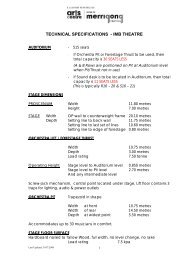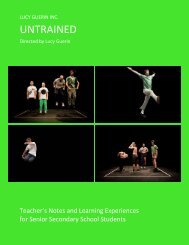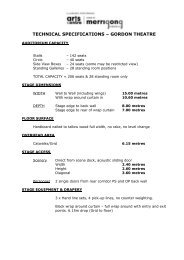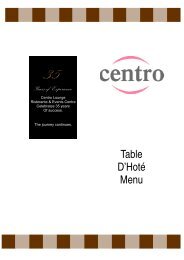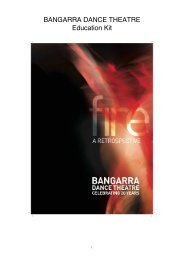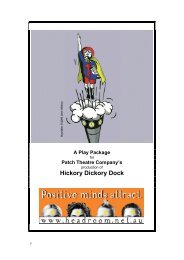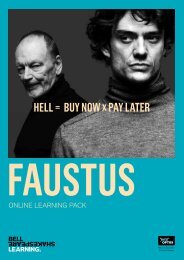Rainbow’s End
Download - Merrigong Theatre Company
Download - Merrigong Theatre Company
- No tags were found...
Create successful ePaper yourself
Turn your PDF publications into a flip-book with our unique Google optimized e-Paper software.
These numbers expose what local leader Neville Atkinson calls "a silent scream". Though Paul Briggs is reluctant to<br />
define his community by such data, which he believes further erodes self-esteem and expectation, he says, "I'd say<br />
we are in a crisis, now … It's a situation that has not occurred because we have invited it, nor because we have sat<br />
on our hands and done nothing."<br />
AS THE sun sets on a chilly river-country training night, netball girls squeal inside clouds of their own breath as they<br />
race each other across the court. Paul Briggs settles with a cuppa in the warm of the social rooms of the institution he<br />
built — the Rumbalara Football Netball Club. Boys jog the boundary line below. The scene epitomises Briggs'<br />
solution to much of what ails his community: joyful and confident embrace and expression of identity.<br />
There's a weariness as he prepares to trot around the same old ground. Thirty years he's been talking about all this.<br />
But he wrestles it down as he looks out on the kids playing hard in the gathering dark. "You can't not be inspired by<br />
that," he says. These are the people whose fate is captured in all that data. "You look at all those faces and you think,<br />
by jeez, I don't want the same descriptives for them."<br />
In many ways Shepparton is better placed than any community in the country to respond to these figures. The<br />
Rumbalara Football Netball Club, and the Aboriginal co-operative, are at the core of an evolving structure of<br />
indigenous organisations and facilities. There's the Academy of Sport, Health and Education (ASHE), supported by<br />
Melbourne University and drawing school-leavers back into education using their passion for sport; indigenous<br />
employment agency Ganbina; the Koori Court, where elders such as Colin Walker shame brash offenders into<br />
squirming contrition; and Indigenous Enterprise Partnerships, its latest effort being a financial literacy pilot.<br />
These efforts have the encouragement and input of a committee of eminent Australians including Police<br />
Commissioner Christine Nixon and ANZ chief economist Saul Eslake. And finally — after years of pleading — they<br />
have a policy unit charged with capturing the disparate, far-flung data, and figuring out what is and isn't working. It<br />
seems breathtaking that despite so many programs over so many years, baseline analysis of what it all means has<br />
been so long neglected. Even the size of the Aboriginal population is uncertain — varying between an official count of<br />
2000 and local estimates closer to 6000.<br />
None of these initiatives has been an accident. They are the legacy of a culture of leadership spawned by activists<br />
from nearby Cummeragunga, the old mission on the Murray. People such as William Cooper, whose lobbying for<br />
recognition underwrites this week's national NAIDOC celebrations, and Pastor Sir Douglas Nicholls, who was mentor<br />
to a young Paul Briggs. They rest in the cemetery at "Cummera", now increasingly crowded by the too-young dead:<br />
teenage suicides and the generation who should have been their elders, claimed by kidney problems, diabetes,<br />
circulatory and respiratory diseases.<br />
Felicia Dean's Mauritian-born great-grandfather was the first teacher at the Cummeragunga schoolhouse, and his<br />
legacy has endured in her family and underpinned her trajectory. "My mum was from a family of 14, and education<br />
was always a big priority." Now she oversees health, housing and support programs at Rumbalara, and pins many of<br />
the problems she sees to the lack of education.<br />
"I also see families struggling from lack of adequate housing, from drugs and alcohol, family violence, employment,<br />
and, like every other Australian, they are struggling financially," says Dean. "There are still families here where no<br />
one, ever, has been gainfully employed. Where a child of 15 or 16 will be the first in their family to complete year 12.<br />
That circle is still there.<br />
"Sometimes it sounds like all doom and gloom," she reflects. But the energy of the buzzing clinic and offices around<br />
her defies that. "Shepparton really is the leader, we've had leaders coming out of here forever and a day." Progress<br />
is under way, "but we have to bring everyone along on the journey … so that everyone is rising".<br />
The home ownership pilot — Shared Responsibility Agreement — that her organisation initiated three years ago was<br />
seen as crucial to that effort. It has been feted as a possible model for a national program — providing financial<br />
counselling to all tenants, and help to those wanting to buy their own homes. It emerged at a time when the Howard<br />
government was moving out of indigenous housing in cities and regions, arguing its priority was to look after remote<br />
areas such as the NT, and that the states and mainstream services could look after urban areas. The Rudd<br />
Government has put a hold on some of that as it re-examines indigenous housing with the states.<br />
Meanwhile, Rumbalara is preparing an application to continue the program, encouraged by good signs from<br />
Canberra.<br />
12




